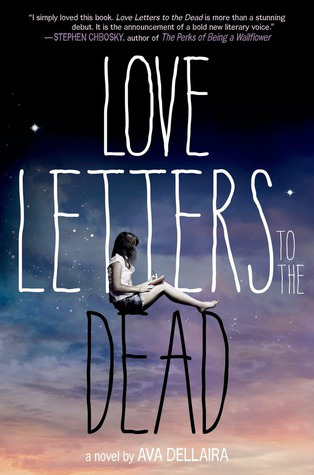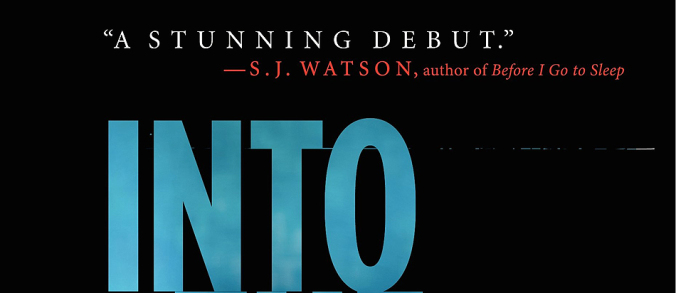I’ve been feeling kind of burned out on fiction. The last two months I’ve only read non-fiction, mostly focusing on the early 19th century, specifically the French Revolution and the Napoleonic Wars. I don’t plan my reading. What I do is randomly buy books based on whatever whim I’m experiencing at the time, so my reading list ends up having a weird six degrees of separation feel where one book flows into the next organically.
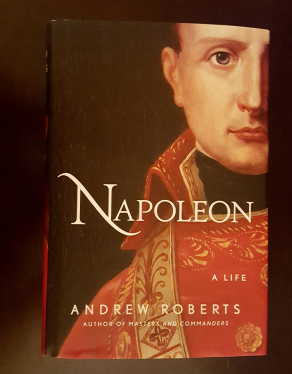 Napoleon: A Life by Andrew Roberts is one of the best biographies I have ever read. Masterfully written covering the life of one of the worlds greatest general and conqueror of Europe since Alexander and Cesar. The massive tome covers Napoleon’s life from his youth in Corsica through the French Revolution, the Egyptian expedition, his triumphs at Austerlitz, and finally his catastrophic campaign in Russia, defeat at Waterloo, and exile and death on St. Helena.
Napoleon: A Life by Andrew Roberts is one of the best biographies I have ever read. Masterfully written covering the life of one of the worlds greatest general and conqueror of Europe since Alexander and Cesar. The massive tome covers Napoleon’s life from his youth in Corsica through the French Revolution, the Egyptian expedition, his triumphs at Austerlitz, and finally his catastrophic campaign in Russia, defeat at Waterloo, and exile and death on St. Helena.
The book gives us an in-depth picture of Napoleon’s personal thoughts due to the recently released collection of 33,000 letters written during his life. It paints a fascinating picture of a vastly intelligent and complex man who micromanaged every little detail of his reign and was able to shoot off a letter focused on winning over the Austrians one minute then switch gears and write a missive correcting the improper wear of uniform by a private he saw a week prior and his recommendation and opinion on the latest Operas playing in Paris.
My favorite sections focused on Napoleon’s interaction with his soldiers and the extreme respect he had for the common grunt and how he showed a genius understanding of the psychology of the soldier. Excellent reading for anybody interested on military leadership, history, the 19th century, and great men in general.
Robert’s work is beyond worthy and I’m glad I picked this book as the first addition to my gentleman’s private library. After the biased abomination of Mary Beard’s SPQR left its foul taste in my mouth I’ve become weary of randomly picking up history books without checking up on the author. If I showed some diligence I would have come across Beards social media posts focused on feminist grievance mongering and idiotic defense of the BBC portraying Roman Legionnaires in Britain as Sub-Saharan Africans and spared myself the aggravation of reading her garbage. So before I ordered this one I read up on Roberts and found his articles well written and free of progressive politics or terrorist apologetics.
SJW’s Always Lie & SJW’s Always Double Down by Vox Day. I came across Vox Day a few years ago through r/fantasy. This was at the early stages of the Puppy war and I was ignorant to the whole political aspect that was tearing through the Hugos apart. Due to some couch fainting hyperbole, I ended up checking out Larry Correia’s writing and actually agreeing with most of his stuff and ended up becoming a fan of his writing. I think that Son of the Black Sword was the best fantasy written in 2015 and I’m glad I got to meet him at a signing in San Diego. Correia led to Vox Day, Castalia House, and eventually to all the Pulp Revolution guys. 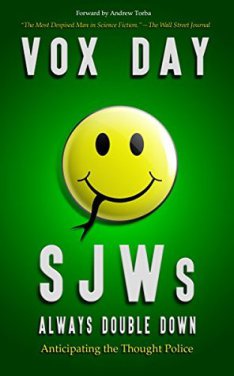
While I don’t agree with all of Vox Day’s politics(I don’t agree with anybody’s whole output.) I do find a lot of his stuff exceptionally interesting and usually on point. I definitely enjoy how well he plays his enemies, causing them to go into foaming self-defeating rages. Yet I never got around to reading his books focusing on SJW’s, who are basically the part of what Harold Bloom describes as the school of resentment, basically a cult of made up of grievance mongers, social hustlers, and the mentally ill.
The two SJW books are basically extended essays outlining the phenomena of social-political infiltration of organizations, hobbies, sub-cultures, and scenes by the above cultists and how to quickly identify and survive their attacks. Written in a simple conversational tone each book is easy to read and overall entertaining. The first suffers from a bit of overindulgence due to the focus on the Hugo awards, a topic I don’t give any fucks about, but the second makes up for it by being tighter and more focused.
Excellent quick reads that illuminate dangerous social phenomena, a must read just for the useful knowledge on how to respond in case you are yourself targeted.
Antifragile: Things That Gain From Disorder by Nassim Nicholas Taleb. Interestingly enough right as I finished SPQR Mary Beard made social media waves by getting into a Twitter and blog battle with Nassim Taleb over the BBC documentary controversy. Taleb called her out on the nonsense peddling and caught my interests because after finishing her book I felt the same way about her writing. I’ve read about Taleb on different blogs in the past but finally decided to give one of his books a try.
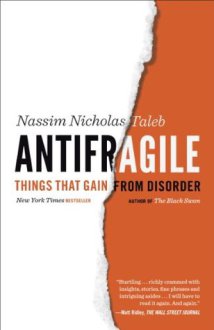 Antifragile is a good book on a fascinating concept that suffers from a bit of excessive indulgence. Mr. Taleb is clearly a brilliant thinker but unfortunately a lackluster writer. The book is unnecessarily long and filled with boring sections that fall short of their intended wit. While the concept is fantastic even the name he gives it is kind of stupid, antifragile sounds dumb when you have a much more elegant word, adaptable. There’s no need to write a long book describing the age-old concept of “not putting all your eggs in one basket,” and basic adaptation and flexibility.
Antifragile is a good book on a fascinating concept that suffers from a bit of excessive indulgence. Mr. Taleb is clearly a brilliant thinker but unfortunately a lackluster writer. The book is unnecessarily long and filled with boring sections that fall short of their intended wit. While the concept is fantastic even the name he gives it is kind of stupid, antifragile sounds dumb when you have a much more elegant word, adaptable. There’s no need to write a long book describing the age-old concept of “not putting all your eggs in one basket,” and basic adaptation and flexibility.
I enjoyed the book and a few chapters stood out but this isn’t one I’m going to go around recommending.
Advertisements Share this:
